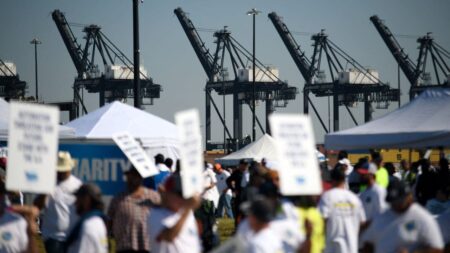By Maria Martinez
BERLIN (Reuters) – Beyond its anti-immigrant stance, Germany’s far-right Alternative for Germany (AfD) has an economic platform that would see Germany leave the European Union as it is today and return to a more limited European system of cooperation.
Here is what is known about the economic policies proposed by the party and how they are seen by mainstream economists.
WHERE DOES THE PARTY SIT ON THE ECONOMIC SPECTRUM?
The AfD was founded in 2013 after the financial crisis by a group of free market economists who were fundamentally critical of European integration and further angered by the EU’s bail-out of Greece and other heavily indebted euro states.
According to AfD vice-chairman and budget committee spokesman Peter Boehringer, the party seeks “a free market economy with a social perspective” largely based on the 1948 model of Ludwig Erhard, the Christian Democrat politician who laid the foundations for Germany’s post-war reconstruction.
However the AfD is adamant about the limits of the state’s role and would seek to cut taxes, including those seen by their backers as progressive and a means of wealth redistribution.
“Any form of state-directed economy will sooner or later end in misallocation and corruption,” its economic program says, arguing for a reduction of state subsidies and a taxation ceiling, as well as abolishing wealth and inheritance taxes.
AND THE AfD WANTS GERMANY TO COMPLETELY LEAVE THE EU?
In essence, yes. Its first manifesto called for major reform of the EU but the euroscepticism has grown with the years.
In 2021, the party decided to seek outright departure from the EU “by negotiation”, Boehringer told Reuters, adding that so-called “Dexit” would look something like Brexit – years of discussion with Brussels until the process could be finalised.
It acknowledges, however, that this goal collides with the pro-EU attitudes of Germans: the latest Eurobarometer poll shows 68% of them have a positive perception of the EU – much higher than the 33% support it had in Britain just ahead of Brexit in 2020.
“At least, our voters are against the EU gaining more and more power,” Boehringer said, calling the 27-nation bloc “a centralised planned economy which the European Commission is enforcing on this continent”.
The party wants Germany to quit the euro and reintroduce the Deutsche Mark, arguing that the single currency has led to all kinds of trade imbalances in the euro zone that previously could be compensated for through currency fluctuations.
The crux of AfD policy on Europe is to return to something akin to the era before the 1992 Maastricht Treaty which not only paved the way for the single currency but a more political union of its member states.
Instead of that, the AfD sees a looser degree of cooperation both on the economy and on joint tasks such as defending external borders or signing trade pacts with third countries.
WHAT IS the AfD PITCH TO LOW-INCOME HOUSEHOLDS?
The party rejects the label of “neo-liberal” associated with the ideas of 19th century, free market capitalism, instead pointing to the German post-war variant – so-called “ordoliberalism” – as having a welfare component.
“We’re not aiming at a Manchester-style free market economy like the UK in the 19th century,” Boehringer said in an English-language interview.
“Companies have to make some profits so that economies can prosper and then there is enough money to promote the poor – that is the cornerstone of the social welfare free market economy,” he said.
The party supports keeping the minimum wage, pension reform and pro-family fiscal incentives.
“Families with children suffer dramatic financial disadvantages when compared to childless families. This results in the impoverishment of families and a lasting low birth rate,” the AfD program says.
A Forsa survey showed an above-average proportion of working-class and unemployed voters among AfD supporters.
WHAT IS THE VERDICT OF MAINSTREAM GERMAN ECONOMISTS?
Most of them focus on the potential impact of the AfD’s flagship policy of leaving the EU and the single currency – membership of which continues to enjoy not only solid support across Germany’s political spectrum but also among voters.
Quite apart from the existential threat to the whole European Union project if Germany – its largest founding member and huge contributor to EU finances – were to leave, economists believe “Dexit” would be devastating for Germany itself.
“In the middle of Europe, Germany is much more exposed to global trade and integrated into pan-European supply chains than the UK was,” said Berenberg chief economist Holger Schmieding.
He estimated that “Dexit” would cost Germany more than 10% of its output within a decade.
Germany’s departure from the euro single currency would trigger “the mother of all financial crises,” said Carsten Brzeski, global head of macro at ING. He predicted the collapse of financial institutions, a sharp increase in public debt and major disruption in the corporate sector.
“Disentangling the monetary, economic and financial integration of 25 years would be an economic disaster,” he said.
It would be the end of the German economic model and destroy millions of good jobs in Germany, said Marcel Fratzscher, president of the economic institute DIW Berlin.
“The result would be a sharp rise in unemployment, far beyond the level that Germany experienced 20 years ago as the sick man of Europe.”
Read the full article here












